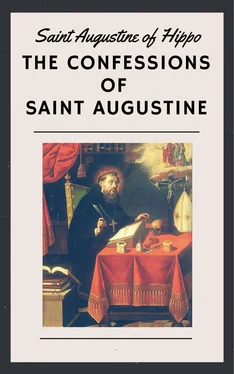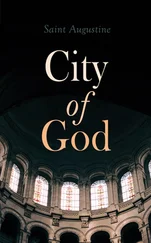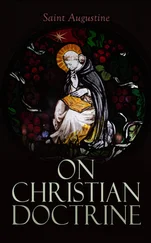Saint Augustine of Hippo - The Confessions of Saint Augustine
Здесь есть возможность читать онлайн «Saint Augustine of Hippo - The Confessions of Saint Augustine» — ознакомительный отрывок электронной книги совершенно бесплатно, а после прочтения отрывка купить полную версию. В некоторых случаях можно слушать аудио, скачать через торрент в формате fb2 и присутствует краткое содержание. Жанр: unrecognised, на английском языке. Описание произведения, (предисловие) а так же отзывы посетителей доступны на портале библиотеки ЛибКат.
- Название:The Confessions of Saint Augustine
- Автор:
- Жанр:
- Год:неизвестен
- ISBN:нет данных
- Рейтинг книги:5 / 5. Голосов: 1
-
Избранное:Добавить в избранное
- Отзывы:
-
Ваша оценка:
- 100
- 1
- 2
- 3
- 4
- 5
The Confessions of Saint Augustine: краткое содержание, описание и аннотация
Предлагаем к чтению аннотацию, описание, краткое содержание или предисловие (зависит от того, что написал сам автор книги «The Confessions of Saint Augustine»). Если вы не нашли необходимую информацию о книге — напишите в комментариях, мы постараемся отыскать её.
The Confessions of Saint Augustine — читать онлайн ознакомительный отрывок
Ниже представлен текст книги, разбитый по страницам. Система сохранения места последней прочитанной страницы, позволяет с удобством читать онлайн бесплатно книгу «The Confessions of Saint Augustine», без необходимости каждый раз заново искать на чём Вы остановились. Поставьте закладку, и сможете в любой момент перейти на страницу, на которой закончили чтение.
Интервал:
Закладка:
How did I burn then, my God, how did I burn to re-mount from earthly things to Thee, nor knew I what Thou wouldest do with me? For with Thee is wisdom. But the love of wisdom is in Greek called "philosophy," with which that book inflamed me. Some there be that seduce through philosophy, under a great, and smooth, and honourable name colouring and disguising their own errors: and almost all who in that and former ages were such, are in that book censured and set forth: there also is made plain that wholesome advice of Thy Spirit, by Thy good and devout servant: Beware lest any man spoil you through philosophy and vain deceit, after the tradition of men, after the rudiments of the world, and not after Christ. For in Him dwelleth all the fulness of the Godhead bodily. And since at that time (Thou, O light of my heart, knowest) Apostolic Scripture was not known to me, I was delighted with that exhortation, so far only, that I was thereby strongly roused, and kindled, and inflamed to love, and seek, and obtain, and hold, and embrace not this or that sect, but wisdom itself whatever it were; and this alone checked me thus unkindled, that the name of Christ was not in it. For this name, according to Thy mercy, O Lord, this name of my Saviour Thy Son, had my tender heart, even with my mother's milk, devoutly drunk in and deeply treasured; and whatsoever was without that name, though never so learned, polished, or true, took not entire hold of me.
I resolved then to bend my mind to the holy Scriptures, that I might see what they were. But behold, I see a thing not understood by the proud, nor laid open to children, lowly in access, in its recesses lofty, and veiled with mysteries; and I was not such as could enter into it, or stoop my neck to follow its steps. For not as I now speak, did I feel when I turned to those Scriptures; but they seemed to me unworthy to be compared to the stateliness of Tully: for my swelling pride shrunk from their lowliness, nor could my sharp wit pierce the interior thereof. Yet were they such as would grow up in a little one. But I disdained to be a little one; and, swollen with pride, took myself to be a great one.
Therefore I fell among men proudly doting, exceeding carnal and prating, in whose mouths were the snares of the Devil, limed with the mixture of the syllables of Thy name, and of our Lord Jesus Christ, and of the Holy Ghost, the Paraclete, our Comforter. These names departed not out of their mouth, but so far forth as the sound only and the noise of the tongue, for the heart was void of truth. Yet they cried out "Truth, Truth," and spake much thereof to me, yet it was not in them: but they spake falsehood, not of Thee only (who truly art Truth), but even of those elements of this world, Thy creatures. And I indeed ought to have passed by even philosophers who spake truth concerning them, for love of Thee, my Father, supremely good, Beauty of all things beautiful. O Truth, Truth, how inwardly did even then the marrow of my soul pant after Thee, when they often and diversely, and in many and huge books, echoed of Thee to me, though it was but an echo? And these were the dishes wherein to me, hungering after Thee, they, instead of Thee, served up the Sun and Moon, beautiful works of Thine, but yet Thy works, not Thyself, no nor Thy first works. For Thy spiritual works are before these corporeal works, celestial though they be, and shining. But I hungered and thirsted not even after those first works of Thine, but after Thee Thyself, the Truth, in whom is no variableness, neither shadow of turning: yet they still set before me in those dishes, glittering fantasies, than which better were it to love this very sun (which is real to our sight at least), than those fantasies which by our eyes deceive our mind. Yet because I thought them to be Thee, I fed thereon; not eagerly, for Thou didst not in them taste to me as Thou art; for Thou wast not these emptinesses, nor was I nourished by them, but exhausted rather. Food in sleep shows very like our food awake; yet are not those asleep nourished by it, for they are asleep. But those were not even any way like to Thee, as Thou hast now spoken to me; for those were corporeal fantasies, false bodies, than which these true bodies, celestial or terrestrial, which with our fleshly sight we behold, are far more certain: these things the beasts and birds discern as well as we, and they are more certain than when we fancy them. And again, we do with more certainty fancy them, than by them conjecture other vaster and infinite bodies which have no being. Such empty husks was I then fed on; and was not fed. But Thou, my soul's Love, in looking for whom I fail, that I may become strong, art neither those bodies which we see, though in heaven; nor those which we see not there; for Thou hast created them, nor dost Thou account them among the chiefest of Thy works. How far then art Thou from those fantasies of mine, fantasies of bodies which altogether are not, than which the images of those bodies, which are, are far more certain, and more certain still the bodies themselves, which yet Thou art not; no, nor yet the soul, which is the life of the bodies. So then, better and more certain is the life of the bodies than the bodies. But Thou art the life of souls, the life of lives, having life in Thyself; and changest not, life of my soul.
Where then wert Thou then to me, and how far from me? Far verily was I straying from Thee, barred from the very husks of the swine, whom with husks I fed. For how much better are the fables of poets and grammarians than these snares? For verses, and poems, and "Medea flying," are more profitable truly than these men's five elements, variously disguised, answering to five dens of darkness, which have no being, yet slay the believer. For verses and poems I can turn to true food, and "Medea flying," though I did sing, I maintained not; though I heard it sung, I believed not: but those things I did believe. Woe, woe, by what steps was I brought down to the depths of hell! toiling and turmoiling through want of Truth, since I sought after Thee, my God (to Thee I confess it, who hadst mercy on me, not as yet confessing), not according to the understanding of the mind, wherein Thou willedst that I should excel the beasts, but according to the sense of the flesh. But Thou wert more inward to me than my most inward part; and higher than my highest. I lighted upon that bold woman, simple and knoweth nothing, shadowed out in Solomon, sitting at the door, and saying, Eat ye bread of secrecies willingly, and drink ye stolen waters which are sweet: she seduced me, because she found my soul dwelling abroad in the eye of my flesh, and ruminating on such food as through it I had devoured.
For other than this, that which really is I knew not; and was, as it were through sharpness of wit, persuaded to assent to foolish deceivers, when they asked me, "whence is evil?" "is God bounded by a bodily shape, and has hairs and nails?" "are they to be esteemed righteous who had many wives at once, and did kill men, and sacrifice living creatures?" At which I, in my ignorance, was much troubled, and departing from the truth, seemed to myself to be making towards it; because as yet I knew not that evil was nothing but a privation of good, until at last a thing ceases altogether to be; which how should I see, the sight of whose eyes reached only to bodies, and of my mind to a phantasm? And I knew not God to be a Spirit, not one who hath parts extended in length and breadth, or whose being was bulk; for every bulk is less in a part than in the whole: and if it be infinite, it must be less in such part as is defined by a certain space, than in its infinitude; and so is not wholly every where, as Spirit, as God. And what that should be in us, by which we were like to God, and might be rightly said to be after the image of God, I was altogether ignorant.
Nor knew I that true inward righteousness which judgeth not according to custom, but out of the most rightful law of God Almighty, whereby the ways of places and times were disposed according to those times and places; itself meantime being the same always and every where, not one thing in one place, and another in another; according to which Abraham, and Isaac, and Jacob, and Moses, and David, were righteous, and all those commended by the mouth of God; but were judged unrighteous by silly men, judging out of man's judgment, and measuring by their own petty habits, the moral habits of the whole human race. As if in an armory, one ignorant what were adapted to each part should cover his head with greaves, or seek to be shod with a helmet, and complain that they fitted not: or as if on a day when business is publicly stopped in the afternoon, one were angered at not being allowed to keep open shop, because he had been in the forenoon; or when in one house he observeth some servant take a thing in his hand, which the butler is not suffered to meddle with; or something permitted out of doors, which is forbidden in the dining-room; and should be angry, that in one house, and one family, the same thing is not allotted every where, and to all. Even such are they who are fretted to hear something to have been lawful for righteous men formerly, which now is not; or that God, for certain temporal respects, commanded them one thing, and these another, obeying both the same righteousness: whereas they see, in one man, and one day, and one house, different things to be fit for different members, and a thing formerly lawful, after a certain time not so; in one corner permitted or commanded, but in another rightly forbidden and punished. Is justice therefore various or mutable? No, but the times, over which it presides, flow not evenly, because they are times. But men whose days are few upon the earth, for that by their senses they cannot harmonise the causes of things in former ages and other nations, which they had not experience of, with these which they have experience of, whereas in one and the same body, day, or family, they easily see what is fitting for each member, and season, part, and person; to the one they take exceptions, to the other they submit.
Читать дальшеИнтервал:
Закладка:
Похожие книги на «The Confessions of Saint Augustine»
Представляем Вашему вниманию похожие книги на «The Confessions of Saint Augustine» списком для выбора. Мы отобрали схожую по названию и смыслу литературу в надежде предоставить читателям больше вариантов отыскать новые, интересные, ещё непрочитанные произведения.
Обсуждение, отзывы о книге «The Confessions of Saint Augustine» и просто собственные мнения читателей. Оставьте ваши комментарии, напишите, что Вы думаете о произведении, его смысле или главных героях. Укажите что конкретно понравилось, а что нет, и почему Вы так считаете.












